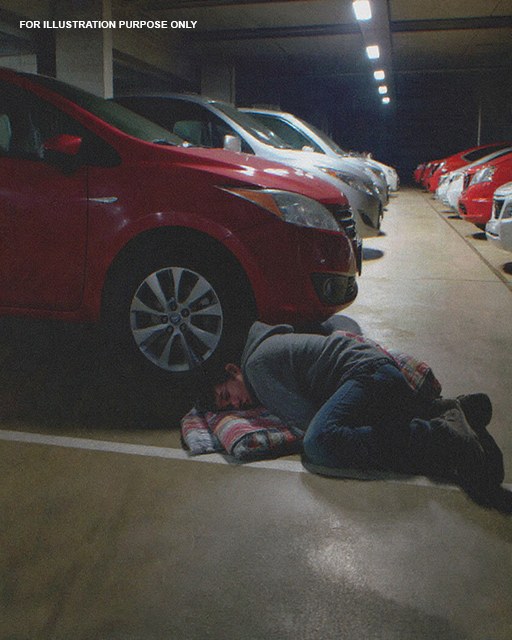It was a bitterly cold November evening, the kind that seeps into your bones and makes the world feel impossibly quiet. I had stayed late on campus, grading essays that demanded every ounce of focus I could muster. Each paper revealed pieces of my students’ hearts—their struggles, their passions, their potential. The classroom was silent except for the scratching of my pen on paper. Hours passed, and the realization hit me: I was alone in the building.
Bundling my coat around me, I crossed the empty courtyard, my breath puffing out in little clouds that vanished instantly in the freezing air. Keys in hand, I was already picturing the warm sanctuary of my apartment and the cup of tea I’d make for myself. But as I neared the parking garage across campus, something caught my eye, something that made me stop mid-step.
At first, it looked like a heap of blankets or discarded clothes, tucked against the concrete wall. But as the pale yellow light spread across the corner, I recognized him.
It was Julian—one of my brightest students. He was curled up on the ground, his arms wrapped tightly around himself, a backpack under his head as a makeshift pillow. His usual alertness was gone; his eyes closed, lips parted, shivering uncontrollably in the biting cold.
“Julian?” My voice cracked slightly, louder than I expected.
His eyes snapped open, wide with fear, scanning the space until they landed on me. Embarrassment flickered across his face as he tried to brush off the blanket.
“Professor Bennett… I—what are you doing here?” he stammered.
I softened my voice. “I should be asking you the same thing. Why are you out here at this hour?”
His shoulders slumped. “I’m… fine,” he muttered. “Just… didn’t want to go home.”
There was more behind those words than he could admit. I knew, instinctively, that this wasn’t just teenage rebellion or a desire for solitude.
“Julian,” I said gently, crouching so I was level with him, “this isn’t safe. You’re going to get sick. Let me drive you home.”
“No!” His voice was sharp and panicked, then quickly softened. “Please… don’t make me.”
I saw the depth of his fear and vulnerability. “Then tell me what’s happening. Please.”
He pressed his lips together, hands trembling as he hugged his knees. Finally, he whispered, “I don’t have a home anymore.”
The words struck me like a physical blow. Julian, the brilliant, curious student who always sat in the front row and asked thoughtful questions, was homeless. Alone. Sleeping in a cold parking garage.
“How long?” I asked softly.
“Since September… after my mom died.”
I remembered the essay he had written months earlier about his mother, her encouragement shaping his love of literature. The pride and love in his words made my heart ache all the more.
“And your father?” I asked cautiously.
“Not around. Never has been,” he replied, the pain clear in his eyes.
I reached out a hand. “You shouldn’t be here like this. Come with me. You don’t have to be alone.”
His pride made him hesitate, shame burning in his gaze. But the cold was relentless, and he finally nodded.
I brought him to my apartment that night. Blanket, warm soup, a place to sleep—simple things, yet lifesaving. Watching him curl up on the couch, exhausted and vulnerable, I realized the weight he had carried alone.
Over the following days, I learned his story: his mother had been his everything, working tirelessly to support his education and dreams. Her sudden passing left him without guidance or safety. Friends’ houses weren’t long-term solutions, and he feared foster care. The campus parking garage became his refuge.
I contacted the school counselor discreetly. Together, we explored housing programs, scholarships, and emergency support. While bureaucracy moved slowly, I provided a temporary home, even knowing the professional risks.
Gradually, Julian’s fear and despair eased. He helped with chores, cooked meals, and slowly began to rebuild his life. His grades improved, his laughter returned, and he regained hope.
Months later, with counselor support, Julian moved into a youth housing program, safe and stable. He hugged me tightly, his voice choked with emotion: “You didn’t just give me a place to stay. You gave me hope again.”
Years later, after graduating with honors and earning a university scholarship, he sent me a letter:
“That night in the parking garage, I thought my life was over. But you saw me. You didn’t walk past. You stopped, and you cared. Because of that, I’m here today, chasing the future my mom dreamed of for me. I’ll never forget what you did.”
Sometimes, the smallest acts of care can change a life entirely. That November night, I simply followed my heart—and it changed everything.
